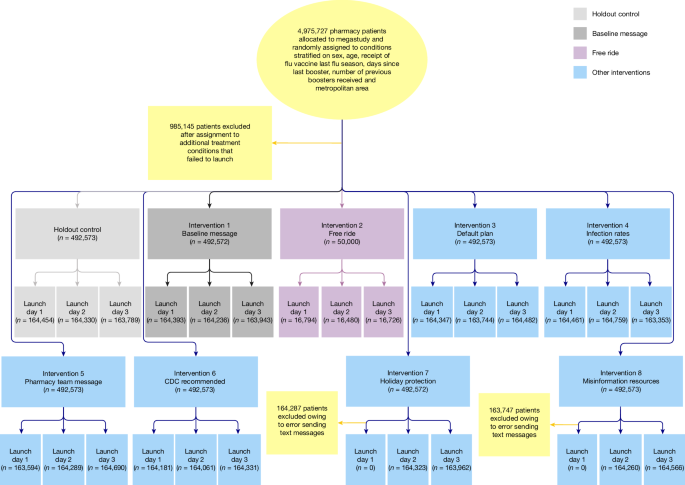insight - Computational Complexity - # Evaluating Interventions to Increase COVID-19 Vaccination Uptake
Megastudy Reveals Effective Vaccine Reminders, but Free Rides Fail to Boost Vaccination Rates
Core Concepts
Behaviourally informed text message reminders significantly increase COVID-19 booster and influenza vaccination uptake, while offering free transportation to vaccination sites provides no additional benefit.
Abstract
This study aimed to evaluate the effectiveness of two approaches to encouraging routine COVID-19 vaccinations: (1) providing free round-trip Lyft rides to vaccination sites, and (2) sending behaviourally informed text message reminders.
The researchers conducted a megastudy with millions of CVS Pharmacy patients in the United States to test these interventions. The key findings are:
Offering free round-trip Lyft rides to vaccination sites had no significant impact on vaccination uptake compared to the control group.
Sending behaviourally informed text message reminders increased 30-day COVID-19 booster uptake by 21% (1.05 percentage points) and 30-day influenza vaccinations by 8% (0.34 percentage points).
The authors conclude that providing free transportation to vaccination sites is not a worthwhile investment, while behaviourally informed vaccine reminders are an effective and low-cost strategy to boost vaccination rates. They emphasize the need for more rigorous testing of interventions to ensure evidence-based solutions are deployed widely.
Megastudy shows that reminders boost vaccination but adding free rides does not - Nature
Stats
Less than one-fifth of Americans received booster vaccines in the autumn of 2022 or 2023.
Offering free round-trip Lyft rides to vaccination sites had no benefit over sending behaviourally informed text message reminders.
Behaviourally informed text message reminders increased 30-day COVID-19 booster uptake by 21% (1.05 percentage points).
Behaviourally informed text message reminders increased 30-day influenza vaccinations by 8% (0.34 percentage points).
Quotes
"Encouraging routine COVID-19 vaccinations is likely to be a crucial policy challenge for decades to come."
"Our results suggest that offering previously vaccinated individuals free rides to vaccination sites is not a good investment in the United States, contrary to the high expectations of both expert and lay forecasters."
"Instead, people in the United States should be sent behaviourally informed COVID-19 vaccination reminders, which increased the 30-day COVID-19 booster uptake by 21% (1.05 percentage points) and spilled over to increase 30-day influenza vaccinations by 8% (0.34 percentage points) in our megastudy."
Key Insights Distilled From
by Katherine L.... at www.nature.com 06-26-2024
https://www.nature.com/articles/s41586-024-07591-x
Deeper Inquiries
What other behavioural interventions could be tested to further increase vaccination uptake?
To further increase vaccination uptake, several other behavioral interventions could be tested. One potential intervention could involve leveraging social norms by highlighting the high vaccination rates within specific communities or social groups. This approach taps into the psychological principle of social proof, where individuals are more likely to engage in a behavior if they believe it is widely accepted within their social circle. Additionally, implementing incentives such as rewards or discounts for individuals who get vaccinated could serve as a powerful motivator. These incentives could range from small tokens of appreciation to more substantial rewards, depending on the target population and the desired level of uptake. Furthermore, employing peer influence strategies, where vaccinated individuals share their positive experiences and encourage others to follow suit, could also be effective in driving vaccination rates.
How might the effectiveness of free transportation vary in different contexts or for different populations?
The effectiveness of free transportation in promoting vaccination uptake may vary depending on the context and the characteristics of the target population. In urban areas with well-developed public transportation systems, the impact of free rides to vaccination sites may be less pronounced, as individuals already have relatively easy access to transportation. On the other hand, in rural or underserved areas where transportation barriers are more significant, offering free rides could have a more substantial impact on vaccination rates. Additionally, the demographic composition of the population, such as age, income level, or cultural background, could influence the effectiveness of free transportation. For instance, older adults or low-income individuals who may face more significant transportation challenges could benefit more from this intervention compared to younger, more affluent populations.
What are the broader implications of this study for designing effective public health policies and interventions?
This study has several important implications for designing effective public health policies and interventions. Firstly, it highlights the importance of evidence-based approaches in promoting vaccination uptake. By rigorously testing different interventions, policymakers can identify strategies that are most likely to succeed and allocate resources efficiently. Secondly, the study underscores the value of behaviorally informed interventions, such as targeted reminders, in influencing health-related behaviors. Understanding the psychological factors that drive decision-making can help tailor interventions to be more effective and impactful. Lastly, the findings suggest that interventions should be context-specific and take into account the unique needs and challenges of different populations. By considering the local context and characteristics of the target population, public health policies can be more tailored and responsive, ultimately leading to better outcomes in promoting vaccination and improving public health.
0
